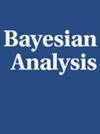存在干扰、治疗不依从和缺失结果的两阶段随机实验的贝叶斯分析
IF 2.5
2区 数学
Q1 MATHEMATICS, INTERDISCIPLINARY APPLICATIONS
引用次数: 4
摘要
在现代复杂的实验中,经常出现的因果推断的三个关键问题是干扰、治疗不依从和缺失结果。大量的研究工作致力于开发分别解决这些问题的因果推理方法。然而,能够同时解决这些问题的方法是缺乏的。我们提出一种贝叶斯因果推理方法来解决这一差距。我们的方法扩展了现有的因果框架和方法,特别是两阶段随机实验和主要分层框架。与使用强结构假设来确定主要因果关系的现有方法相比,我们的贝叶斯方法使用灵活的分布模型,可以适应干扰和缺失结果的复杂性,并确保主要因果关系是弱可识别的。我们通过模拟研究和对来自印度国家健康保险计划评估的真实数据的重新分析来说明我们的方法。我们的方法使我们能够确定在过去的分析中没有确定的新的积极因果关系。最终,我们的模拟研究和案例研究表明,我们的方法如何在现代实验中产生更多的信息分析,包括干扰、治疗不依从、缺失结果和复杂的结果产生机制。本文章由计算机程序翻译,如有差异,请以英文原文为准。
A Bayesian Analysis of Two-Stage Randomized Experiments in the Presence of Interference, Treatment Nonadherence, and Missing Outcomes
Three critical issues for causal inference that often occur in modern, complicated experiments are interference, treatment nonadherence, and missing outcomes. A great deal of research efforts has been dedicated to developing causal inferential methodologies that address these issues separately. However, methodologies that can address these issues simultaneously are lacking. We propose a Bayesian causal inference methodology to address this gap. Our methodology extends existing causal frameworks and methods, specifically, two-staged randomized experiments and the principal stratification framework. In contrast to existing methods that invoke strong structural assumptions to identify principal causal effects, our Bayesian approach uses flexible distributional models that can accommodate the complexities of interference and missing outcomes, and that ensure that principal causal effects are weakly identifiable. We illustrate our methodology via simulation studies and a re-analysis of real-life data from an evaluation of India's National Health Insurance Program. Our methodology enables us to identify new active causal effects that were not identified in past analyses. Ultimately, our simulation studies and case study demonstrate how our methodology can yield more informative analyses in modern experiments with interference, treatment nonadherence, missing outcomes, and complicated outcome generation mechanisms.
求助全文
通过发布文献求助,成功后即可免费获取论文全文。
去求助
来源期刊

Bayesian Analysis
数学-数学跨学科应用
CiteScore
6.50
自引率
13.60%
发文量
59
审稿时长
>12 weeks
期刊介绍:
Bayesian Analysis is an electronic journal of the International Society for Bayesian Analysis. It seeks to publish a wide range of articles that demonstrate or discuss Bayesian methods in some theoretical or applied context. The journal welcomes submissions involving presentation of new computational and statistical methods; critical reviews and discussions of existing approaches; historical perspectives; description of important scientific or policy application areas; case studies; and methods for experimental design, data collection, data sharing, or data mining.
Evaluation of submissions is based on importance of content and effectiveness of communication. Discussion papers are typically chosen by the Editor in Chief, or suggested by an Editor, among the regular submissions. In addition, the Journal encourages individual authors to submit manuscripts for consideration as discussion papers.
 求助内容:
求助内容: 应助结果提醒方式:
应助结果提醒方式:


